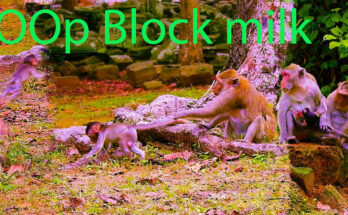Spring Don’t Go Far From Pongo, Just Sit Near
In the peaceful shade of the jungle canopy, where warm breezes carried the sounds of birds and distant monkey chatter, one quiet relationship began to blossom—one not marked by drama or competition, but by gentle companionship. It was the bond between Spring, a shy and sweet young female monkey, and the calm, powerful leader of the troop, Pongo.
Pongo was no ordinary male. His large frame and commanding presence marked him as king of the troop, but his eyes told a deeper story—one of wisdom, patience, and surprising softness. While other females vied for his attention with bold gestures and loud displays, Spring was different. She never pushed, never begged. She simply sat near.
And for Pongo, that quiet presence began to mean something.
Spring had always been a timid soul, often staying in the background during troop gatherings. She wasn’t the fastest climber or the most dominant female, but she had a peaceful aura that made her easy to be around. She loved watching the trees sway in the wind and gently grooming the younger monkeys who came to rest near her. When Pongo passed by, she didn’t chase after him like the others. Instead, she simply moved a little closer and sat nearby—watching, listening, just being there.
At first, it went unnoticed. Pongo had many responsibilities, from settling disputes among younger males to protecting the troop from outside threats. But slowly, he began to recognize the small monkey who always appeared in his periphery—never demanding, always near.
One warm morning, as the troop settled near a stream to drink and rest, Pongo chose a large rock and laid down to relax in the sun. Within moments, Spring found a spot just a few steps away. She didn’t approach directly. She didn’t try to touch him. She simply sat, curling her tail around her legs, her eyes calm and her posture relaxed.
And Pongo let her stay.
From that day on, it became a quiet routine. Wherever Pongo rested, Spring would gently find a place not far off and sit. Not too close to invade his space, but close enough to share it. Their silent connection grew slowly, like the first leaves of spring—delicate, unnoticed, yet full of potential.
The other monkeys began to notice. Some of the younger females whispered among themselves, puzzled by Pongo’s tolerance of the quiet girl who never made a fuss. Others tried to interrupt, placing themselves between the two, only to be met with Pongo’s low grunt of disapproval. It was subtle but clear—Spring was welcome.
One afternoon, a sudden cry echoed through the trees—a warning of a snake slithering near the troop’s edge. The monkeys scrambled upward into the branches, and Pongo, always alert, moved to lead the defense. But as he did, he glanced back—and saw Spring frozen in place, startled and unsure.
Without hesitation, he circled back, placing himself between Spring and the danger. It was quick, almost instinctual, but deeply telling. Once the threat passed, Spring sat beside him—closer than ever before. Pongo let her.
Spring didn’t need to run, shout, or fight for his attention. Her quiet loyalty, her gentle presence, and her respectful distance had spoken louder than any chase. Pongo understood her now—and he accepted her.
And so, every day, as the troop moved through the jungle, Spring didn’t wander far. She didn’t seek adventure in the tallest trees or try to impress the dominant females. She was content right where she was—just near Pongo.
Not all bonds in the wild are loud or dramatic. Some, like Spring and Pongo’s, are built in silence, with patience, peace, and presence. And in that quiet space between them, something unspoken but strong bloomed—like springtime itself.


